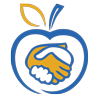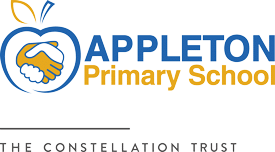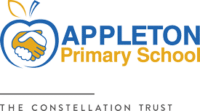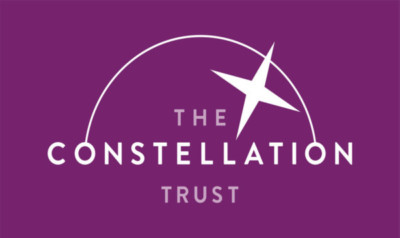Maths – curriculum overview
Intent
At Appleton Maths objectives are taken from the National Curriculum, and are structured into key areas of learning, which are consistent in each year group across the school.
Mathematical knowledge, can be linked to engaging topics, but will be gained by the teaching of year group progressive skills, which build on previous learning, ensuring pupil’s learning becomes embedded. In addition to this, pupils will engage in enrichment activities to support their learning of Mathematics for a real purpose through Jigsaw and Cross-curricular lessons.
In Maths, by the end of EYFS children will:
Have an understanding of Number and of Shape, Space and Measure throughout the foundation stage. With a deep understanding particularly of numbers to 10. Resulting with the Early Learning Goals for assessment at the end of EYFS.
By the end of Key Stage 1 children will:
Develop confidence and mental fluency with whole numbers, counting and place value. This should involve working with numerals, words and the four operations, including with practical resources [for example, concrete objects and measuring tools]. Pupils should develop their ability to recognise, describe, draw, compare and sort different shapes and use the related vocabulary. They should also use a range of measures to describe and compare different quantities such as length, mass, capacity/volume, time and money. By the end of year 2, pupils should know the number bonds to 20 and be precise in using and understanding place value. An emphasis on practice at this early stage will aid fluency. Pupils should read and spell mathematical vocabulary, at a level consistent with their increasing word reading and spelling knowledge at key stage 1.
By the end of Lower Key Stage 2 children will:
Become increasingly fluent with whole numbers and the four operations, including number facts and the concept of place value. They will develop efficient written and mental methods and perform calculations accurately with increasingly large whole numbers. Pupils should develop their ability to solve a range of problems, including with simple fractions and decimal place value. Pupils will have the opportunity draw with increasing accuracy and develop mathematical reasoning so they can analyse shapes and their properties, and confidently describe the relationships between them. It should ensure that they can use measuring instruments with accuracy and make connections between measure and number. By the end of year 4, pupils should have memorised their multiplication tables up to and including the 12 multiplication table and show precision and fluency in their work. Pupils should read and spell mathematical vocabulary correctly and confidently, using their growing word reading knowledge and their knowledge of spelling.
By the end of Upper Key Stage 2 children will:
Extend their understanding of the number system and place value to include larger integers. This should develop the connections that pupils make between multiplication and division with fractions, decimals, percentages and ratio. Pupils should develop their ability to solve a wider range of problems, including increasingly complex properties of numbers and arithmetic, and problems demanding efficient written and mental methods of calculation. With this foundation in arithmetic, pupils are introduced to the language of algebra as a means for solving a variety of problems. Teaching in geometry and measures should consolidate and extend knowledge developed in number. Pupils will classify shapes with increasingly complex geometric properties and that they learn the vocabulary they need to describe them. By the end of year 6, pupils should be fluent in written methods for all four operations, including long multiplication and division, and in working with fractions, decimals and percentages. Pupils should read, spell and pronounce mathematical vocabulary correctly.
Implementation
In Maths, progressive skills such as number bonds, times tables and the four operations are used to underpin the necessary knowledge of place value and number within year groups. Lesson objectives are structured and sequenced so that final outcomes are secure and meaningful. Children do not learn objectives in isolation but continue to embed these through carefully planned application of skills throughout the year.
All children have access to the Maths curriculum, as work is tailored appropriately for children with SEND. Children will learn through similar activities, with outcomes modified to suit all needs.
Impact
Maths Impact This is shown in:
- KPI records
- Progress records and data overviews
- Benchmarking against national tests
- Pupil voice
- Links to Staff Performance Management targets
- Subject Action and School Development Plans and SSE cycle.
Curriculum progression information:

“Big shout out to the teachers – doing a great job.”

“Resources have been really helpful and provided challenge.”

“You do an amazing job with our children.”

“Thank you from myself and my boys – we just wanted to show our appreciation.”

“Had a lovely morning visiting the school. It’s always a pleasure to meet with teachers who value the importance of the Arts in education.”

“It looks like the children are really enjoying themselves.”

“Very enthusiastic pupils with lots of energy and impeccable behaviour.”

“Fantastic school, students were brilliant. Thanks for having us.”

“Thank you to all teachers. Good teaching changes lives.”

“My son is sad to be leaving Appleton. He has loved his time at the school.”

“Thank you for your support at this time – it has really meant a lot.”

“Thank you for your efforts, it makes a huge difference to the kids!”

“Thanks as always for putting the school work onto the website for my children.”

“Thank you to everyone involved in producing that work as it is a perfect indicator of what levels and subjects to go with.”

“The children were an absolute delight, full of smiles and energy. Thank you for a lovely afternoon.”




